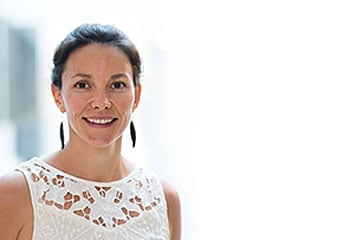When University of Toronto alumni donated $1 million to create bursaries for indigenous students at the university’s faculty of law, Amanda Carling, a Métis lawyer, Faculty of Law alumna and manager of indigenous Initiatives at the Faculty of Law, says she was “gobsmacked.”

When University of Toronto alumni donated $1 million to create bursaries for indigenous students at the university’s faculty of law, Amanda Carling, a Métis lawyer, Faculty of Law alumna and manager of Indigenous Initiatives at the Faculty of Law, says she was “gobsmacked.”
“It’s wonderful. I feel a deep gratitude for their generosity,” she says.
Norman Loveland, who graduated from the faculty of law in 1972 and is a now-retired tax lawyer and former partner at Osler Hoskin & Harcourt LLP, and Gay Loveland say the contribution is “to help right the wrongs in Canada’s history with its indigenous peoples.”
In a statement, Norman Loveland went on to say it’s important to support indigenous people in pursuing fields such as the law so “they will be at the forefront of tackling issues and working with their leaders in their communities,” something he feels is an important part of the reconciliation process.
Law students at U of T have been partaking in the Blanket Exercise, one of the initiatives at the law school meant to help further understanding of reconciliation with Canada’s indigenous communities.
During the 1.5-hour workshop, blankets are laid out to represent Turtle Island — what we now call North America — and the participants play the role of indigenous people, going through the process of colonization from first contact to present day. There is a focus on how the law has been used and manipulated to disenfranchise indigenous people and create the cultural genocide that the Truth and Reconciliation Commission looked at. Scrolls are given to some to read out, many containing the wrongs done by settlers against First Nation, Inuit and Métis people.
Carling says the last scroll, a quote from Murray Sinclair, sticks out in her mind.
“Our leaders need to show the way, but no matter how many deals and agreements they make, it’s in our daily conversations and interactions that our success as a nation in forging a better place will ultimately be measured. It’s what we say to and about each other in public and in private that we need to look at changing.
“When people like the Lovelands, who are not indigenous people and have no indigenous family members, do something like this, that is exactly what the Truth and Reconciliation Commission is calling upon us to do as a country,” says Carling.
“It can’t just be the indigenous folks that are bearing the brunt of moving this country toward reconciliation, because if it’s just us it’s never going to happen. It needs to be an equal effort on the other side as well.” She calls the Lovelands “real allies.”
Carling says there is a misconception that all indigenous people have access to free post-secondary education. While some communities of First Nations people who are “status Indians” under the Indian Act do receive funding from the federal government to pay for some students’ tuition, living expenses and books, that funding is significantly limited.
“Even students who get funded by their band through the federal government — that money is not for free,” Carling points out. “The land has been given up, access to clean drinking water, access to food, access to culture, access to ceremony — all those kinds of things are why the federal government provides that money.”
While there are also some other scholarships and bursaries that indigenous people can access — such as through Indspire, which provides some funding for all indigenous students regardless of official status — “it’s a patchwork and it’s imperfect,” Carling says.
“Building up our needs-based financial program is the key funding priority for this chapter at the law school, and I am excited at the prospect of supporting Indigenous students attending the Faculty of Law with the help of their gift,” law school dean Edward Iacobucci said in the release.
The $1-million endowment exists into perpetuity, and the interest earned from the gift is what goes into the financial aid pot, Carling explains, adding that the university’s needs-based financial aid program is available for all law students whether or not they have indigenous heritage. With matching funds from U of T’s Boundless program, about $80,000 a year is available to fund indigenous students at the Faculty of Law who are eligible for financial aid and there is no theoretical maximum to the number of students who can benefit each year — it depends on the monies available and the needs of the students who qualify.
Norman Loveland said in the news release he has always felt the couple should do something meaningful for their alma mater, and “the Faculty of Law is making every effort to ensure that anybody who has the capacity and the interest and drive to go to law school will not be precluded for lack of money.
“Gay and I very much wanted to support this effort,” he said.
Carling says the donation means there will be more money available for the non-indigenous students as well, which is important to the school as well “because we also recognize indigenous students are not the only ones who have need — there are students who are otherwise marginalized by race and socio-economic status and all kinds of other things that present barriers to marginalized people accessing legal education.”










